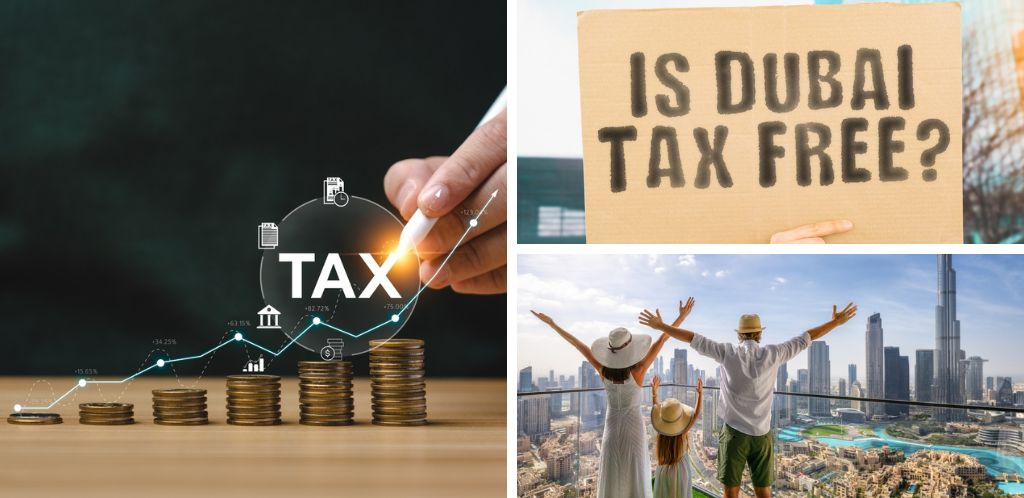Now Reading: Island Real Estate in Dubai for Expats: Taxes, Rules, Risks
-
01
Island Real Estate in Dubai for Expats: Taxes, Rules, Risks
Island Real Estate in Dubai for Expats: Taxes, Rules, Risks

Table of Contents
Imagine stepping into your Palm Jumeirah villa, the Arabian Gulf sparkling outside, knowing you’ve secured a tax-smart investment as an expat in Dubai. In 2025, Dubai’s island destinations Palm Jumeirah, Palm Jebel Ali, and Dubai Islands are a haven for expatriate investors, offering 100% freehold ownership, a dirham pegged to the U.S. dollar for stability, and no personal income tax, capital gains tax, or annual property taxes for individuals.
With 58% of buyers from countries like the UK, India, and Russia, Dubai recorded 94,000 property transactions in the first half of 2025. These islands boast 4-6% rental yields and 8-15% price appreciation, outpacing London (2-4%) or New York (3-4%). Properties over $545,000 qualify for a 10-year Golden Visa, while smaller units offer 2-year residency perks, making them ideal for expats seeking residency and returns.
Residential purchases dodge 5% VAT, but transfer fees, corporate taxes for some, and new 2025 regulations require careful navigation. This guide explores taxes, rules, and risks for expats investing in projects like Palm Jumeirah Ocean Villas, Palm Jebel Ali Coastal Villas, and Dubai Islands Haven Living, helping you build wealth while enjoying island life.
Why Dubai’s Islands Are an Expat’s Dream
Just 15-30 minutes from Dubai International Airport via Sheikh Zayed Road or water taxi, Palm Jumeirah, Palm Jebel Ali, and Dubai Islands span 50-80 kilometers of coastline, offering luxury villas, eco-friendly designs, and low 2-3% vacancy rates compared to 7-10% globally, driven by 25 million tourists and a 5% population surge. Expats keep 100% of rental income ($48,000-$240,000 annually on a $1.2 million-$6 million property), versus $26,400-$144,000 elsewhere after taxes.
Zero capital gains tax saves $60,000-$280,000 on a $300,000-$1 million profit, and no annual property taxes save $12,000-$120,000 yearly, unlike New York (1-2%) or London (council tax up to 2%). Residential purchases avoid 5% VAT ($60,000-$300,000), and Golden Visa eligibility enhances residency security. For expats, these islands blend lifestyle and financial perks, though fees and corporate taxes need attention.
The tax-light allure feels like a warm welcome to your new home.
No Personal Income Tax: Keep Your Rental Income
As an expat, you pay no personal income tax on rental income, unlike the U.S. (up to 37%) or UK (up to 45%). A $2 million Haven Living apartment on Dubai Islands yielding $80,000-$120,000 annually keeps every dirham, saving $36,000-$48,000 compared to taxed markets. A $4 million Palm Jumeirah villa yielding $160,000-$240,000 saves $72,000-$96,000.
Short-term rentals, boosted by 25 million tourists, require DTCM registration ($408-$816), while long-term leases need Ejari registration ($54-$136). Short-term rentals in Palm Jumeirah boost yields by 15-20% ($12,000-$48,000), while Palm Jebel Ali and Dubai Islands offer 10-15% ($8,000-$36,000). This tax-free income is a major draw for expats, but VAT compliance is key for short-term rentals.
Tax-free rentals feel like a monthly gift to your expat lifestyle.
Zero Capital Gains Tax: Profit Without Pain
Dubai’s zero capital gains tax lets expats keep 100% of sale profits. Selling a $2 million Haven Living apartment for $2.5 million after 25% appreciation yields a $500,000 tax-free profit, saving $100,000-$140,000 compared to London (20-28%) or New York (20-37%). A $4 million Palm Jumeirah villa sold for $5 million yields a $1 million tax-free gain, saving $200,000-$280,000.
Price growth varies: Palm Jumeirah at 8-12%, Palm Jebel Ali at 10-15% due to limited supply, and Dubai Islands at 8-12%. While a 4% Dubai Land Department (DLD) fee applies on resale ($80,000-$160,000), often split, this tax-free perk maximizes returns for expats planning to sell.
Keeping every dirham feels like a financial high-five for your future.
No Annual Property Taxes: Save on Ownership
Unlike global markets where annual property taxes cost $12,000-$120,000 on a $1.2 million-$6 million property, Dubai’s islands impose none, easing the financial burden for expats. Maintenance fees vary: $15,000-$25,000 for Palm Jumeirah’s luxury villas, $12,000-$20,000 for Palm Jebel Ali’s eco-friendly designs, and $5,000-$14,000 for Dubai Islands’ modern projects.
A 5% municipality fee on rentals ($2,400-$12,000) applies, with Palm Jumeirah’s higher fees reflecting premium amenities like private beaches. These costs are far lower than London’s council tax ($24,000-$120,000) or New York’s property tax, making ownership more affordable for expats balancing relocation costs.
No property taxes feel like a weight lifted from your island home.
VAT Rules: A Light Touch for Expats
Residential purchases are VAT-exempt, saving $60,000-$300,000 on a $1.2 million-$6 million property, unlike commercial properties or the UK’s stamp duty (up to 12%). Off-plan purchases, common in Palm Jebel Ali and Dubai Islands, may incur 5% VAT on developer fees ($20,000-$80,000), recoverable via Federal Tax Authority (FTA) registration ($500-$1,000).
Expats running short-term rentals must register for VAT if revenue exceeds $102,041, charging 5% but claiming credits on expenses like DTCM fees ($408-$816). A $2 million Haven Living apartment yielding $80,000-$120,000 incurs $4,000-$6,000 in VAT but allows $1,000-$3,000 in credits. A $4 million Palm Jumeirah villa yielding $160,000-$240,000 incurs $8,000-$12,000 but allows $2,000-$5,000 in credits. Non-compliance risks fines up to $13,612, so expats must keep diligent records.
The VAT exemption feels like a friendly nod to your investment.
DLD Fees: Upfront Costs for Expat Buyers
The 4% DLD fee, typically split between buyer and seller, is a key cost: $48,000 for a $1.2 million Haven Living apartment or $160,000 for a $4 million Palm Jumeirah villa. Gift transfers to family or shareholders reduce DLD to 0.125%, saving $46,500-$155,000. For example, gifting a $4 million property cuts the DLD fee from $160,000 to $5,000.
Title deed issuance adds $136-$272, and broker fees, typically 2% ($24,000-$80,000), may be waived for off-plan projects in Dubai Islands. Mortgage registration (0.25% of the loan, or $3,000 for a $1.2 million loan) and valuation fees ($680-$1,360) apply for financed deals. Expats can negotiate DLD splits or use gift transfers to lower costs, easing the transition to ownership.
DLD fees feel like a small step toward your island dream.
Corporate Tax: A Concern for Expat Businesses
The 9% corporate tax, introduced in 2023, applies to businesses unless exempt, impacting expats holding properties through companies. A company leasing a $2 million Haven Living apartment yielding $80,000-$120,000 faces a 9% tax ($7,200-$10,800), reducing net income to $72,800-$109,200. A $4 million Palm Jumeirah villa yielding $160,000-$240,000 incurs $14,400-$21,600 in tax.
Qualified Free Zone Person (QFZP) status in areas like Dubai Multi Commodities Centre (DMCC) avoids this, saving $20,400-$61,200, with setup costs of $2,000-$5,000. Small business relief waives corporate tax for revenues under $816,000 until December 31, 2026. Most expats prefer individual ownership to avoid this tax entirely.
Corporate tax feels like a navigable hurdle for expat entrepreneurs.
New Tax Rule 1: Domestic Minimum Top-up Tax (DMTT)
Effective January 1, 2025, the DMTT imposes a 15% tax on multinational enterprises (MNEs) with global revenues over €750 million ($793 million). A corporate entity leasing 10 properties with $1 million in income faces a 15% tax ($150,000), reducing net income to $850,000. Individual expats and smaller entities with revenues below $816,000 are unaffected, and QFZP status avoids DMTT, saving $12,240-$61,200. This rule targets large corporations, preserving Dubai’s tax-light appeal for most expat investors.
The DMTT feels like a corporate tweak, sparing your personal wealth.
New Tax Rule 2: Qualifying Investment Fund (QIF) Updates
Cabinet Decision No. 34 of 2025, effective Q2 2025, refines QIF and Real Estate Investment Trust (REIT) rules. QIFs remain exempt from corporate tax if real estate income is below 10% of total income and ownership is diversified. If a QIF earns $1 million, with $200,000 from rentals, 80% ($160,000) faces 9% tax ($14,400). Restructuring costs $1,500-$4,000. Individual expats avoid these rules, enjoying tax-free gains, while corporate expats must structure portfolios carefully.
QIF updates feel like a strategic puzzle for business-minded expats.
Palm Jumeirah: Ocean Villas
Ocean Villas by Nakheel, set for completion in Q2 2025, offer 4-6 bedroom villas ($3 million-$6 million) with 4-6% rental yields and 8-12% price growth. A $4 million villa yields $160,000-$240,000 tax-free, saving $72,000-$96,000. Selling for $5 million yields a $1 million tax-free profit, saving $200,000-$280,000. No property taxes save $40,000-$80,000 yearly, and VAT exemption saves $200,000.
Transfer costs include a 4% DLD fee ($160,000), 2% broker fee ($80,000), and title deed issuance ($136-$272). Gift transfers save $155,000. Maintenance fees are $15,000-$25,000, with a 5% municipality fee ($8,000-$12,000). QFZP saves $40,800-$61,200 for corporates. U.S. expats deduct depreciation ($72,727-$109,091), saving up to $36,364. Golden Visa eligibility applies.
The beachfront elegance feels like a tax-free expat paradise.
Palm Jebel Ali: Coastal Villas
Coastal Villas by Nakheel, set for completion in Q3 2025, offer 4-6 bedroom villas ($2.72 million-$5.44 million) with 4-6% rental yields and 10-15% price growth. A $3 million villa yields $120,000-$180,000 tax-free, saving $54,000-$72,000. Selling for $3.75 million yields a $750,000 tax-free profit, saving $150,000-$210,000. No property taxes save $30,000-$60,000 yearly, and VAT exemption saves $150,000. Transfer costs include a 4% DLD fee ($108,900-$217,800), 2% broker fee ($54,450-$108,900), and title deed issuance ($136-$272). Gift transfers save $106,650-$213,300. Maintenance fees are $12,000-$20,000, with a 5% municipality fee ($6,000-$9,000). QFZP saves $30,600-$45,900. U.S. expats deduct depreciation ($54,545-$98,182), saving up to $34,091. Golden Visa eligibility applies.
The eco-friendly charm feels like a tax-efficient expat retreat.
Dubai Islands: Haven Living
Haven Living by Metac Properties, set for completion in Q4 2025, offers 1-3 bedroom apartments ($475,750-$1.2 million) with 4-6% rental yields and 8-12% price growth. A $1.2 million apartment yields $48,000-$72,000 tax-free, saving $21,600-$28,800. Selling for $1.5 million yields a $300,000 tax-free profit, saving $60,000-$84,000. No property taxes save $12,000-$24,000 yearly, and VAT exemption saves $60,000.
Transfer costs include a 4% DLD fee ($48,000), 2% broker fee ($24,000), and title deed issuance ($136-$272). Gift transfers save $46,500. Maintenance fees are $5,000-$10,000, with a 5% municipality fee ($2,400-$3,600). QFZP saves $12,240-$18,360. U.S. expats deduct depreciation ($21,818-$43,636), saving up to $17,455. Golden Visa eligibility applies for properties over $545,000.
The waterfront charm feels like a budget-friendly expat haven.
Key Rules for Expat Investors

Expats must register properties with the DLD to secure title deeds, ensuring legal ownership. Short-term rentals require a DTCM license ($408-$816), and VAT registration if revenue exceeds $102,041. Indian expats must disclose properties in India’s Foreign Asset schedule to avoid $135,000 penalties under the Black Money Act. UK expats may face remittance basis charges (up to 45% on UK-taxed income), avoidable via double taxation treaties with 130+ countries, saving $21,600-$96,000. Verify developer escrow compliance under the 2025 Oqood system to protect off-plan investments. Non-residents need a UAE bank account for transactions, costing $136-$272 to open.
These rules feel like a clear path to secure ownership.
Risks to Watch in 2025
A projected oversupply of 41,000 units may slow price growth, with Palm Jumeirah less affected due to its prestige. Choose trusted developers like Nakheel or Metac Properties and verify escrow compliance. Target low-vacancy projects (2-3%) to ensure rental demand. Non-compliance with VAT or DTCM rules risks fines up to $13,612, and corporate tax errors can cost $136,125. Short-term rentals in Palm Jumeirah leverage tourists, while Palm Jebel Ali and Dubai Islands suit long-term leases. Currency fluctuations, like a 5% dirham shift, could affect returns for expats converting to pounds or rupees.
Strategies to Maximize Tax Benefits
For individuals: First, hold properties personally to avoid corporate taxes. Second, negotiate DLD fee splits, saving $24,000-$80,000 on a $1.2 million-$4 million property. Third, use gift transfers to reduce DLD to 0.125%, saving $46,500-$155,000. Fourth, recover 5% VAT on developer fees via FTA registration ($500-$1,000). Fifth, leverage double taxation treaties to avoid foreign taxes.
Sixth, U.S. expats deduct depreciation ($21,818-$109,091) and management fees ($2,400-$14,545), saving up to $36,364. For corporates: First, obtain QFZP status to avoid 9% tax and DMTT. Second, keep QIF income below 10%. Third, use small business relief until 2026. Hire a property manager ($5,000-$25,000 annually) and tax professionals ($1,000-$3,000) to avoid fines.
These strategies feel like a roadmap to expat wealth.
Why Dubai’s Islands Are Expat-Friendly
Palm Jumeirah Ocean Villas, Palm Jebel Ali Coastal Villas, and Dubai Islands Haven Living offer no personal income tax, capital gains tax, or property taxes, saving $12,000-$280,000 annually. With 4-6% yields, 8-15% price growth, and Golden Visa perks, these 2025 projects make Dubai’s islands a tax-efficient, luxurious haven for expats who navigate rules and risks wisely.
read more: Is Dubai Still Tax-Free for Real Estate? 2025 Policy Updates






















